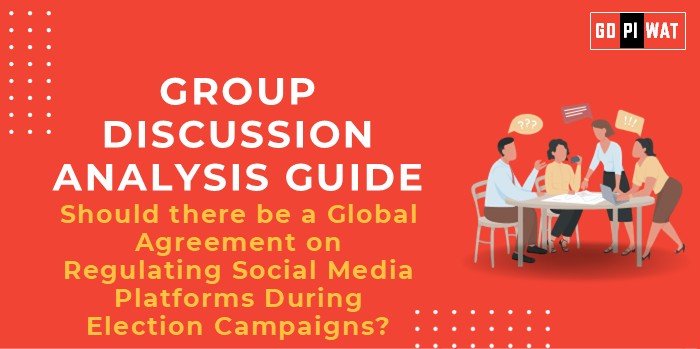📋 Group Discussion Analysis Guide
🌐 Should There Be a Global Agreement on Regulating Social Media Platforms During Election Campaigns?
🌟 Introduction to the Topic
Opening Context: Social media platforms play a pivotal role in shaping public opinion, especially during elections. Their unregulated use has raised concerns about misinformation, foreign interference, and ethical campaign practices.
Topic Background: The debate about global regulation stems from incidents like Cambridge Analytica’s influence on elections and Russia’s alleged meddling in the 2016 U.S. presidential election. With elections occurring in a hyperconnected digital age, creating a global framework for fair practices is increasingly relevant.
📊 Quick Facts and Key Statistics
- 🌍 Global Social Media Users: 4.9 billion (2023) – Highlights the vast influence of social media.
- 📰 Election Misinformation: 50% of surveyed citizens in 2024 G20 countries reported encountering fake news during campaigns.
- 💰 Ad Spend on Social Media: $4 billion globally in 2023 elections.
- ⚠️ Foreign Interference Cases: At least 10 major democracies reported such incidents since 2016.
👥 Stakeholders and Their Roles
- 🏛️ Governments: Draft regulations, ensure fair practices.
- 📱 Social Media Platforms: Monitor and control content, disclose ad funding sources.
- 🌐 International Organizations: Advocate for global standards (e.g., UN, EU).
- 👩💻 Citizens: Exercise media literacy, report misinformation.
- 🏛️ NGOs: Campaign for transparency and hold platforms accountable.
🏆 Achievements and Challenges
✨ Achievements:
- 🔍 Enhanced Awareness: Many platforms introduced transparency tools for political ads (e.g., Facebook’s Ad Library).
- 🇩🇪 Localized Regulations: Nations like Germany (NetzDG law) successfully curbed hate speech and misinformation.
- 📈 Public Engagement: Improved political participation and discourse through digital access.
⚠️ Challenges:
- 🌍 Cross-Border Jurisdiction Issues: Different legal frameworks across countries.
- ⚡ Platform Accountability: Limited action against misinformation spreaders.
- 🤖 Technological Evolution: Rapid emergence of AI-generated content (deepfakes).
📄 Structured Arguments for Discussion
- ✔️ Supporting Stance: “A global agreement ensures fairness by preventing any one country or platform from disproportionately influencing global elections.”
- ❌ Opposing Stance: “Local regulations are better suited as global rules may dilute cultural and political nuances.”
- ⚖️ Balanced Perspective: “A hybrid model of global standards combined with localized enforcement can address unique challenges.”
🚀 Effective Discussion Approaches
- 📚 Case Study Opening: “The Cambridge Analytica incident highlights the critical need for robust social media regulation.”
- 📊 Statistical Insight: “50% of G20 citizens encountered misinformation during elections, emphasizing the global scale of the issue.”
🔍 Strategic Analysis of Strengths and Weaknesses
- Strengths: Encourages transparency, mitigates foreign interference, builds public trust.
- Weaknesses: Implementation challenges, potential resistance from sovereign governments.
- Opportunities: Leverage AI for detection, strengthen international cooperation.
- Threats: Platform manipulation by bad actors, enforcement disparities.
📚 Connecting with B-School Applications
- 🌐 Real-World Applications: Framework development in public policy or ethics in digital governance.
- 💬 Sample Interview Questions:
- “How can a global framework for social media regulation benefit developing democracies?”
- “Propose solutions to balance free speech with misinformation control.”
- 📈 Insights: Explore tech-led solutions, regulatory impact assessments, and policy formulation for digital platforms.


